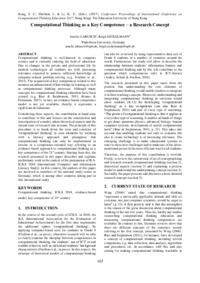Computational Thinking as a Key Competencea Research Concept
Zu finden in: International Conference on Computational Thinking Education (Seite 103 bis 106), 2017
  |
 |
 Diese Seite wurde seit 8 Jahren inhaltlich nicht mehr aktualisiert.
Unter Umständen ist sie nicht mehr aktuell.
Diese Seite wurde seit 8 Jahren inhaltlich nicht mehr aktualisiert.
Unter Umständen ist sie nicht mehr aktuell.
 Zusammenfassungen
Zusammenfassungen
 Computational thinking is well-known in computer science and is currently entering the field of education. Due to changes in the private and professional life by modern technologies all students are with increasing relevance expected to possess sufficient knowledge in computer-related problem-solving (e.g. Fraillon et al., 2014). The acquisition of key competences related to this assumes an enhancement of knowledge in learning as well as computational thinking processes. Although many concepts for computational thinking education have been created (e.g. Barr & Stephenson, 2011; Krauss & Prottsman, 2017), in fact, an evidence-based competence model is not yet available, thereby it represents a significant desideratum.
Computational thinking is well-known in computer science and is currently entering the field of education. Due to changes in the private and professional life by modern technologies all students are with increasing relevance expected to possess sufficient knowledge in computer-related problem-solving (e.g. Fraillon et al., 2014). The acquisition of key competences related to this assumes an enhancement of knowledge in learning as well as computational thinking processes. Although many concepts for computational thinking education have been created (e.g. Barr & Stephenson, 2011; Krauss & Prottsman, 2017), in fact, an evidence-based competence model is not yet available, thereby it represents a significant desideratum.Considering these aspects, the contribution at hand aims to contribute to this and focuses on the construction and investigation of a model, taken theoretical aspects and the current state of research into account. The principle of this procedure is to break down the term and construct of ‘computational thinking’ to core elements by working with a literacy approach and presuppose that computational thinking can only be implemented in lessons in a competence-oriented way referring to an evidence-based approach to computational thinking as a key competence of the 21st century. Starting from this, the research presented in this paper describes and explains preliminary work in the context of the preparation of IEA-ICILS 2018 (International Computer and Information Literacy Study). In this context, the authors of this paper are involved as members of the national study center in Germany, which is among other countries taking part in this international study.
 Dieses Konferenz-Paper erwähnt ...
Dieses Konferenz-Paper erwähnt ...
 Personen KB IB clear | John Ainley , Julian Fraillon , Tim Friedman , Eveline Gebhardt , Karl R. Popper , Wolfram Schulz , Jeannette M. Wing | ||||||||||||||||||||||||||||||||||||
 Begriffe KB IB clear | computational thinkingcomputational thinking
,  ICILS
, Informatikcomputer science
, Informationskompetenzinformation literacy ICILS
, Informatikcomputer science
, Informationskompetenzinformation literacy
| ||||||||||||||||||||||||||||||||||||
 Bücher |
| ||||||||||||||||||||||||||||||||||||
 Texte |
|
 Dieses Konferenz-Paper erwähnt vermutlich nicht ...
Dieses Konferenz-Paper erwähnt vermutlich nicht ... 
 Nicht erwähnte Begriffe | ICILS 2018, Informatik-Didaktik, Informatik-Unterricht (Fachinformatik) |
 Tagcloud
Tagcloud
 Zitationsgraph
Zitationsgraph
 Zitationsgraph (Beta-Test mit vis.js)
Zitationsgraph (Beta-Test mit vis.js)
 Volltext dieses Dokuments
Volltext dieses Dokuments
 Anderswo suchen
Anderswo suchen 
 Beat und dieses Konferenz-Paper
Beat und dieses Konferenz-Paper
Beat hat Dieses Konferenz-Paper während seiner Zeit am Institut für Medien und Schule (IMS) ins Biblionetz aufgenommen. Er hat Dieses Konferenz-Paper einmalig erfasst und bisher nicht mehr bearbeitet. Beat besitzt kein physisches, aber ein digitales Exemplar. (das er aber aus Urheberrechtsgründen nicht einfach weitergeben darf). Aufgrund der wenigen Einträge im Biblionetz scheint er es nicht wirklich gelesen zu haben. Es gibt bisher auch nur wenige Objekte im Biblionetz, die dieses Werk zitieren.












 , 123 kByte)
, 123 kByte)  Biblionetz-History
Biblionetz-History